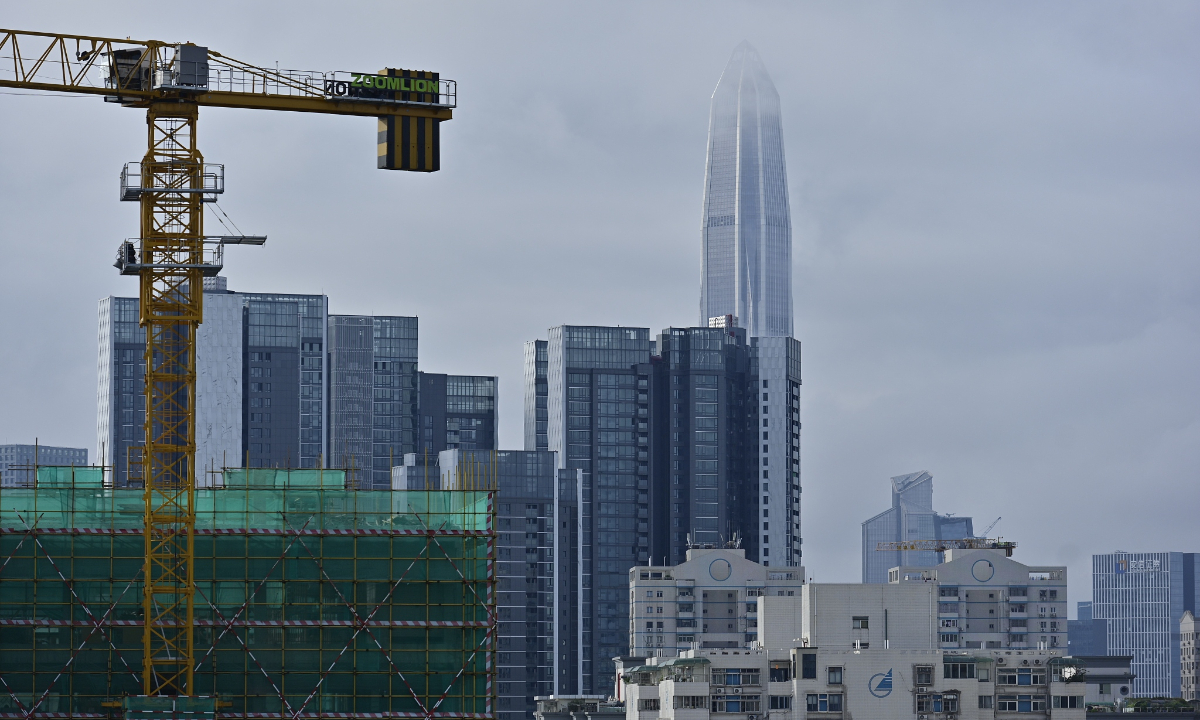
Shenzhen real estate Photo:VCG
The value of the top 50 Chinese real estate developers' land purchases surged 130.2 percent month-on-month in September. Industry experts said on Sunday that the housing market has shown signs of bouncing back from the bottom, thanks to the stable recovery of the economy and effective government policies to ensure the sound development of the property sector.
In September, 10 cities including Beijing, Shanghai, Shenzhen in South China's Guangdong Province and Hangzhou in East China's Zhejiang Province released the third batch of land for development, domestic news site thepaper.com reported.
Over the first nine months, the top 100 developers' land transactions totaled 1.05 trillion yuan ($147 billion), down 51.2 percent year-on-year, according to the report. During the period, companies in the Yangtze River Delta region topped the ranking, followed by developers in the Guangdong-Hong Kong-Macao Greater Bay Area and in the Beijing-Tianjin-Hebei region.
In addition, foreign investors such as BlackRock, Daiwa House Group and Tishman Speyer Properties rushed to enter China's property sector in the first three quarters of 2022, covering rentals, industrial parks and commercial real estate.
For instance, Canadian fund manager Brookfield Asset Management Inc recently acquired a serviced apartment project in Shanghai's Yangpu District for 1.26 billion yuan as the first property in a new line of multi-family projects, according to media reports.
"The improvement in real estate companies' bidding for land comes amid market expectations that China's property market is bouncing back from the bottom," Song Ding, a research fellow at the Shenzhen-based China Development Institute, told the Global Times on Sunday.
In a fresh sign of a turnaround, 17.1 percent of respondents opted for home purchases when it comes to planned increases in spending over the next three months, the central bank found in its latest quarterly survey of urban depositors.
The results released on Sunday compare with 16.9 percent of surveyed depositors who opted for this during the second quarter.
Over the seven-day National Day holidays (October 1-7), transactions of secondhand homes saw a mild recovery nationwide. According to data from domestic renting app zhuge.com, transactions in five major cities rose 98.4 percent year-on-year. Beijing reported a sales gain of 74.4 percent year-on-year and transactions in Shenzhen rose 275 percent, news site china.com reported.
Song said that favorable home-purchasing policies, efforts to start stalled housing projects as well as accumulated market demand together spurred the gains.
The Chinese government recently announced a set of new measures to promote the sound development of the housing market. By the end of 2022, the authorities in some Chinese cities are able to decide if they will retain, reduce or remove local limits on mortgages on first-home purchases, according to a circular jointly issued by the People's Bank of China, the central bank, and the China Banking and Insurance Regulatory Commission.
As of October 1, the central bank cut the loan interest rate for the housing provident fund for first-home buyers by 0.15 percentage points, while the Ministry of Finance will refund the individual income tax for qualified home buyers from the same day to the end of 2023.
Starting this month, Beijing has lowered the interest rate for housing provident fund loans by 0.15 percentage points for first-home buyers, the Beijing Daily reported on Sunday. That suggests the capital city has cut the interest rate for loans with a term of five-plus years from the housing provident fund to 3.1 percent, the report said.
Yan Yuejin, research director at Shanghai-based E-house China R&D Institute, said that there would be a wave of housing mortgage rate cuts across the country during the fourth quarter this year, which is expected to stimulate home-buyers' expectations and boost home sales.
"However, we can't be too optimistic, as some developers' debt problems haven't been completely resolved and some stalled projects haven't started," Song said, noting that the central government may ramp up efforts to further propel the growth of the real estate market.
Global Times




